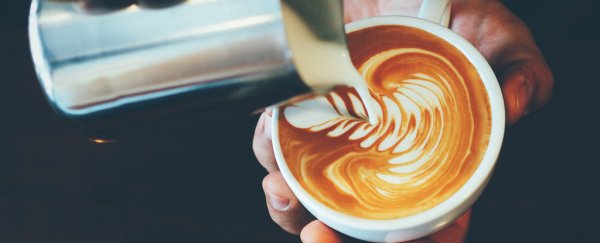If you're serious about your coffee, you probably brew your own at home from freshly ground coffee beans. If that's you, read on – and if it's not, read on anyway, because you really ought to pass this tip on to your local neighbourhood barista if they don't already know about it.
Scientists in the UK have figured out a simple way to maximise the flavour of our favourite morning brew, and it couldn't be easier: just freeze your coffee beans before you grind them.
Of course, lots of savvy coffee drinkers already store their coffee beans in the fridge or freezer to preserve freshness, but according to researchers from the University of Bath, chilling your beans before they're ground up doesn't just prevent them from spoiling.
If they're kept cold right up until they're ground, it also ensures a more uniform grind of fine coffee particles, the scientists say, which ultimately allows for a better, more even extraction of flavour compounds.
"What you're looking for is a grind that has the smallest difference between the smallest and largest particle," said chemist Christopher Hendon, now at MIT. "If you have small grinds you can push flavour extraction upwards."
Hendon and his team experimented with grinding beans at a number of different temperatures in the lab – from room temperature all the way down to –196°C (–320°F). They discovered that the colder the bean, the more consistent and finer the grind.
"We found that chilling the beans tightens up this process and can give higher extractions with less variance in the flavour," said Hendon, "so you would have to brew it for less time, or could get more coffee from the same beans."
While sadly few of us have freezers in our kitchens that could take our beans all the way down to –196°C (–320°F) in temperature, the principle still applies: go colder to enhance the flavour, as the warmer your beans are before they're ground, the more inconsistent the grind ends up being.
This matters, because flavour in coffee brewing is directly tied to the surface area of ground coffee particles, with water extracting flavour from smaller particles quicker than it can from bigger grounds where less surface is exposed.
"It will alter the taste, because subtle changes in particle size distributions make a huge difference in rate of extraction," said Hendon. "I wouldn't be surprised if people struggled to achieve balanced extractions."
To help out with the testing, Hendon teamed up with coffee roasters from a local specialty coffee store, and the researchers suggest their findings aren't simply limited to maximising coffee flavour – because even grinds can deliver more flavour from less coffee, it ultimately means a more efficient way of making coffee.
And that's important, because using coffee more efficiently isn't just in the interest of aficionados – given the world could soon be facing a huge coffee shortage, any new discoveries that can improve how we ultimately brew our morning pick-me-ups have to be welcomed with open arms.
"It could have a major impact for the industry," said Hendon. "People are trying to produce a very high quality drink with really quite powerful tools, and are willing to try new things."
Now that you know how to store and grind your coffee better, don't waste this little lifehack by drinking coffee at the wrong time of day. While many of us enjoy a cup early in the day, depending on where your cortisol levels are at, you might be better off delaying your caffeine intake until mid-morning rather than first thing to get the most out of it.
Also, while coffee can have great energising effects, we shouldn't get overly reliant on it. A study published this week found that after enough sleep deprivation, caffeine intake ceases to improve alertness.
In the study, participants saw benefits from caffeine after two nights of sleep restriction, but after the third night of getting just 5 hours of sleep each night, those stimulant effects were lost.
And whatever you do, according to the latest World Health Organisation (WHO) advice, don't drink your coffee too hot, as scientists think excessively hot beverages could be linked to cancer of the oesophagus.
Sheesh, nobody said enjoying coffee was easy.
